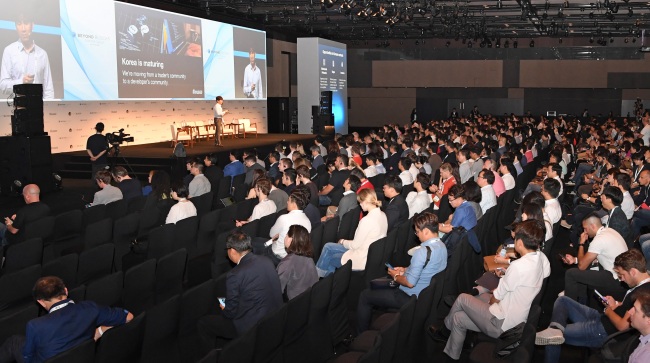Armed with high-tech social infrastructure and a digital-savvy public familiar with blockchain and cryptocurrencies, South Korea is cut out to become the world’s first country to demonstrate a real decentralized economy at work, experts at the Beyond Blocks Seoul Summit said Tuesday.
Korea has potential to become the ideal “test bed” for new decentralized apps running on blockchain and cryptocurrencies, said Simon Sejoon Kim, CEO of Korea-based cryptocurrency fund Hashed, during a keynote speech.
“Korea is the most attractive test bed for decentralized projects,” Kim said. “Here, companies with blockchain protocols can discover decentralized apps with ‘real-world usage’ to introduce on their platforms, while decentralized apps can promote its services to local users who have already learned the value of digital assets. Investors, on the other hand, can find many good decentralized projects.”
 |
The Beyond Blocks Summit Seoul conference kicks off at the Shilla Seoul on Tuesday. (Beyond Blocks) |
The key to the success of any blockchain-powered project is the comprehensive value of its network, which hinges on the degree of technological connectivity and the number of users who are actually joined in the network.
And Korea is well-prepared to meet these requirements, Kim said, citing Korea’s strong track record of being a first mover in developing and adopting new digital trends on a large scale. It means Koreans will probably be the first to pick up and popularize decentralized apps in the future.
“When new digital technologies and trends emerge, Korea has traditionally been one of the first countries to adopt them,” said the Hashed CEO, who also pointed out that Korea has the fastest internet speed in the world, the highest smartphone penetration rate and the world’s fourth-highest app store revenue. Coupled with a digital-friendly mindset and the population density of Seoul, new trends spread quickly.
These factors are how nationally successful services like Nexon’s “Kingdom of the Winds,” the world’s first massively multiplayer online role-playing game, and Cyworld, the world’s first social networking site to profit from the sales of virtual goods, were born in Korea.
Now, blockchain and cryptocurrencies are among Korea’s biggest tech interests, and the related industry is booming from both an industry and user perspective. Initial coin offerings, or ICOs, have drawn controversy, but they have not been banned here, drawing continued investment, the crypto fund chief said.
Big companies like Korean mobile messaging giant Kakao and e-commerce platform TMON are developing their own blockchain protocols or taking part in third-party blockchain projects. Many startups have set out to introduce and popularize new Dapps, while launching new tokens via ICOs.
Meanwhile, public awareness of blockchain technology and token economy systems are high. Local investors, who have already experienced major ups and downs in crypto prices, are able to make more mature decisions on which crypto projects are valuable and merit investment.
Looking ahead, Korea will likely see continued investment driven toward ICOs, since local regulators are motivated to place “sensible regulations” that do not hinder the growth of the crypto industry, said Kim & Jang attorney Samuel Yim during a panel discussion on “Governance and ICOs.”
“It’s been a fluctuating regulatory environment (in Korea), with talks of a ban on initial coin offerings and cryptocurrency exchanges being taken down creating a negative sentiment. But now, I think there’s definitely a more positive stance by the Korean government,” he said.
“I’m optimistic that sensible regulations will come in the near future. Blockchain and cryptocurrencies are a good element of the fourth industrial revolution, and the government does realize it wants to help Korea become a leader in these new technologies.”
Yim thinks that Korea will be announcing its formal ICO regulations by the year’s end, in a format that sits somewhere between the “laissez-faire approach of Singapore” and the “heavy regulation approach of the US and Japan.”
The Beyond Blocks Summit Seoul, which continues through Wednesday, was co-hosted by Beyond Blocks, Factblock and Korea-based cryptocurrency fund Hashed. Main sponsors include Bezant and the Seoul Metropolitan Government. The event is part of the ongoing Korea Blockchain Week.
By Sohn Ji-young (
jys@heraldcorp.com)





![[Exclusive] Hyundai Mobis eyes closer ties with BYD](http://res.heraldm.com/phpwas/restmb_idxmake.php?idx=644&simg=/content/image/2024/11/25/20241125050044_0.jpg)
![[Herald Review] 'Gangnam B-Side' combines social realism with masterful suspense, performance](http://res.heraldm.com/phpwas/restmb_idxmake.php?idx=644&simg=/content/image/2024/11/25/20241125050072_0.jpg)

